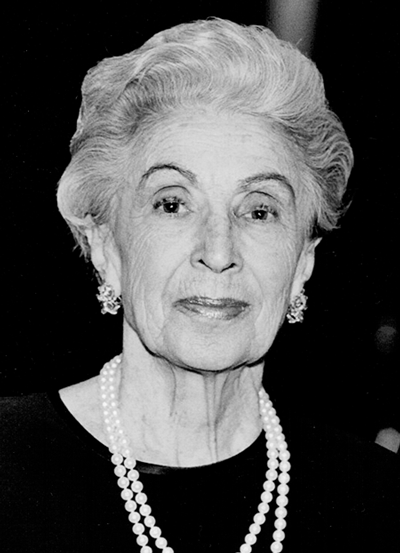The native of Lodz, Poland, died last October at the age of 91
By ERIN ELLIOTT BRYAN / Community News Editor
In the April 27, 1990, edition of the AJW, local Holocaust survivor Mina Freier penned a lengthy letter to the editor recounting the recent Yom HaShoah commemoration.
“As a survivor, I never miss the commemoration,” Freier wrote. “It always is a moving experience, full of sad memories of the past brought back.”
Freier went on to laud the organizers of the event as well as those who spoke or offered music. She also noted that there was a workshop for youth led by children of Holocaust survivors.

But then she made a point to speak about who was there — or, more importantly, who wasn’t there.
Remembrance
“Most of the audience consisted of the old-timers, the living remainder of the survivors of the Holocaust and their families,” she wrote. “It is a pity that so few American-born Jews, our friends and neighbors, didn’t attend the short 60-minute program… Those of you who missed it, to spend the sunny afternoon taking a walk around the lakes or watching a TV sports broadcast, missed a memorable afternoon. It was you who should have sat in the audience and listened to the stories told by young people, stories which were more powerful than the best dramatic television performance and much more informative. We, the people who attended the commemoration, don’t need to be told the stories. We know, we were there, we lived it…”
Freier, of Golden Valley, died Oct. 15, 2014. She was 91.
Freier was born May 1, 1923, in Lodz, Poland. Her father was in the restaurant business and her mother came from a family that owned a printing company, according to her daughter, Sara Zuk. Together with her older sister, Esther, Freier enjoyed a privileged, upper middle-class childhood.
“They had a good life until the war,” Zuk told the AJW.
Freier was just a young teenager when she and her mother and sister were sent to the Lodz Ghetto (her father had died from a heart attack). Her mother was later killed by the Nazis, but Freier and her sister survived, staying in the ghetto long enough for Freier to become a nurse working at the hospital there.
Freier was eventually transported to several camps, including Freiberg, Auschwitz-Birkenau and Mauthausen, from which she was liberated.
After the war, she was reunited with Henry Freier, who had been married to her youngest aunt. His wife and young child were killed at Auschwitz, and he helped to reconnect Mina with her sister, Esther.
Henry and Mina eventually married, welcomed daughter Sara and lived for a short time in Germany. There, while waiting to immigrate to Minnesota where Henry had relatives, Mina studied English.
“She was a really bright, bright woman, very talented,” Zuk said. “She wasn’t able to get the kind of education that she should have had. My guess would be she would have become a doctor had she had the opportunity, but the war intervened.”
The Freiers arrived in the United States in 1949 and welcomed son Dan in 1950. Freier became an active volunteer with City of Hope, the Talmud Torah Ladies Auxiliary, Mount Sinai Hospital, Courage Center, Hadassah, Temple Israel and numerous other causes.
But she also began to speak publicly about her experiences during the Holocaust, particularly to high school students, and was among the first to do so in the Twin Cities. Zuk described her mother as very articulate and outspoken.
“She wanted the younger generations to know what happened, so it wouldn’t happen again,” Zuk said. “That was her age when the war started and so she was able to share that with them, what it was like to be in a horrible situation like that when she was their age. And I think that was a big thing that she gave to the community.”
Freier also loved to travel and to dance, and always took pride in her appearance. Zuk described her mother as “super elegant” and said that she was once photographed as an example of “fashion plate on the street.”
Speaking at Freier’s funeral, Rabbi Marcia Zimmerman, of Temple Israel, also noted Freier’s “dramatic flair.” Additionally, Zimmerman mentioned Freier’s crafting hobby and described the intricate needlepoint that Freier donated to the shul, which decorates the room in which Freier studied Torah on Shabbat.
Zimmerman said Freier “loved a challenge and loved to wow all who gazed upon her work… Talented and meticulous, Mina succeeded at everything and anything she did.”
Freier took immense pride in her family, and doted on her grandchildren, Naomi and Miriam, and her great-grandchildren, Zavdi, Mirele and Heschel. And that was a special relationship for Zuk to witness.
“All of my grandparents were dead by the time the war was over, so for me, that was really important to see that interaction with my children, which was something that I missed,” Zuk said. “She imparted a lot of knowledge to her grandchildren so they don’t forget. Even my grandson, who’s only seven years old, knows about some of it already because he asks questions about the war. And we can relate to him through my mother’s experiences.”
Freier was preceded in death by her husband, Henry, and sister, Esther Latarus. She is survived by daughter Sara, son Dan, two grandchildren and three great-grandchildren.
(American Jewish World, 1.16.15)


















